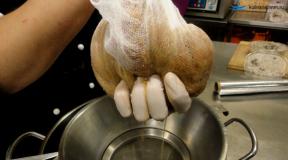Here is such a generalissimo. The fate of the Brunswicks Marriage with Anna Leopoldovna
Not many in our country even know the name of the town - Kholmogory. However, in pre-Petrine times and earlier, it was a rather large and glorious city for those times. And there is one story in which the Kholmogory played an important role.
For 12 years in Kholmogory, the deposed young Russian emperor Ivan VI (Ioann Antonovich), who formally ruled the Russian Empire from 1740 to 1741, was secretly kept. In fact, his mother ruled - Princess Anna Leopoldovna, who performed the role of regent with her young son, but this unfortunate baby entered Russian history precisely as an emperor.
Agree, this is a unique case - the legitimate Russian emperor was secretly kept in Kholmogory from 1744 to 1756. Then he was transferred to Shlisselburg, where in April 1764 he was killed by security officers.
The emperor's mother Anna Leopoldovna - from November 9, 1740 to November 25, 1741, the all-powerful regent-ruler of the Russian Empire - died during exile in 1746 in Kholmogory. The body was transported to St. Petersburg and beautified under the floor of the Annunciation Church of the Alexander Nevsky Lavra.
Prince Anton Ulrich of Brunswick, father of the Russian Emperor Ivan VI, was born in 1714, died in 1776. He spent 32 years in the Kholmogory prison. Anton Ulrich was buried at the wall of the Assumption Cathedral in Kholmogory. A memorial cross has now been erected, but the exact place of his grave is unknown.


Anton Ulrich came from a branched old family of the Dukes of Braunschweig. His relatives held a very high position in Europe. King George I of England was his uncle, his aunt Elizabeth Christiana became the Austrian queen, the younger sister was married to Frederick the Great, and the older brother was married to Frederick's sister. And Anton Ulrich himself, before he got to Kholmogory, was a Russian generalissimo and commander of the Semyonovsky Life Guards Regiment.
Originally contain Braunschweig family was planned in the Nikolo-Korelsky monastery, on the very shore of the White Sea, but when transporting the family along the Dvina, they were forced to stay in Kholmogory until the end of the freeze-up. The temporary stop dragged on for three long decades ... Maybe this is for the best.
In Europe, they simply did not know where to look for the Brunswick family, whether they were alive. Russian "iron masks" have sunk into oblivion. It is hard to imagine what could have happened if the Germans had managed to take the Brunswicks to the West.
Russia waged a bloody Seven Years War against the Prussian king Frederick the Great. The younger sister of the Kholmogory prisoner Anton Ulrich of Braunschweig was Frederick's wife, and the older brother was married to Frederick's sister. Kinship ties with the royal dynasty of Prussia are the strongest. If Frederick knew where the Braunschweig family were hiding, and organized their escape, then the history of Russia could radically change. The lawful Russian emperor Ivan VI would have ended up in Frederick's camp, and it is not a fact that the illegitimate Elizaveta Petrovna, who had overthrown him, who had come to power as a result of a palace coup, would have been able to retain power.
It was quite possible to run their Kholmogory by water with external support. You can go down on a fishing cabras along the Northern Dvina, in the labyrinth of islands bypass the customs checkpoints, dive into the Dvinskaya Bay on a ship and leave for Europe. A day on the Dvina, a month at sea - and the political alignment will change dramatically. The main thing is to find a pilot, bribe or neutralize the guards and not let the alarm be raised within 20 hours after the escape, and then look for the wind in the sea.

But it didn’t happen. The grown-up emperor was transferred to Shlisselburg, where on July 5, 1764, during an unsuccessful attempt by lieutenant Vasily Mirovich to free the prisoner, he was killed.
The burial place of Ivan Antonovich remained unknown for a long time. But there was a hypothesis that his body was transported to Kholmogory and buried there. And in 2008, during the demolition of the water tower, a grave was discovered, which was initially considered the grave of Anton Ulrich. But on the basis of objective data obtained during a preliminary examination of the remains, it was suggested that this burial may belong to a member of the Braunschweig family - the eldest son of Anton Ulrich - Ivan Antonovich, Emperor of Russia Ivan VI. The remains were sent to Moscow, to the Russian forensic medical center.
At present, the examination has shown that it is most likely Ivan VI. Only genetic expertise is missing.
The second son of Duke Ferdinand Albrecht of Braunschweig-Wolfenbüttel (until 1735 of Brunswick-Bevern) and Antoinette Amalia of Braunschweig-Wolfenbüttel, brother of the famous Prussian commander Duke Ferdinand of Braunschweig and Juliana Maria in the 17th-17th king
Marriage with Anna Leopoldovna
When Empress Anna Ioannovna was looking for a groom for her niece, Princess Anne of Mecklenburg-Schwerin, under the influence of the Austrian court, she chose Anton. The latter arrived in Russia at the beginning of June 1733 when he was still a boy. Here they began to educate him together with Anna in the hope that a strong affection will be established between the young people, which will eventually turn into a more necessary feeling. These hopes were not justified. At first glance, Anna disliked her betrothed, a young man of short stature, effeminate, a stutterer, very limited, but modest, with a soft and malleable character. Nevertheless, this marriage took place on July 14, 1739; On August 23, 1740, their first-born, Ivan, was born. Soon, the empress became terminally ill and, at the insistence of Biron and Chancellor Bestuzhev, declared Ivan Antonovich heir to the throne, and Biron as regent.
Regency of Biron
Prince Anton Ulrich was very unhappy with this will; he wanted to change the decree on regency, but he lacked the courage and ability to take advantage of a favorable moment. He turned to Osterman and Keyserling for advice, but they restrained him, although they did not blame him. At the same time, but apart from any involvement of Prince Anton Ulrich, there was a ferment in the guard against Biron. The conspiracy was opened, the leaders of the movement - the cabinet secretary Yakovlev, officer Pustoshkin and their comrades - were punished with a whip, and Prince Anton Ulrich, who also turned out to be compromised, was invited to an emergency meeting of cabinet ministers, senators and generals. Here on October 23, the very day when the decree was given on the annual issuance of 200,000 rubles to the parents of the young emperor, he was strictly instructed that at the slightest attempt by him to overthrow the established system, he would be treated like any other subject of the emperor. Subsequently, he was forced to sign a request for dismissal from his posts: Lieutenant Colonel Semyonovsky and Colonel Cuirassier Brunswick regiments, and he was completely removed from the affairs of the board.
Regency of Anna Leopoldovna
Biron treated the emperor's parents scornfully, openly insulted them and even threatened to take the young emperor away from his mother and then expel Anton Ulrich and his wife from Russia. The rumor about this made Anna Leopoldovna decide to take a desperate step. She turned to Field Marshal Munnich for help, and the last November 8 put a quick end to Biron's reign. All this, apparently, took place apart from any participation and knowledge of Prince Anton Ulrich. The regency passed to Anna Leopoldovna, while Anton Ulrich was proclaimed generalissimo of the Russian troops on November 11.
Link to the Arkhangelsk province
But the reign of Anna Leopoldovna did not last long. The palace coup, carried out on the night of December 5-6, 1741, elevated Elizaveta Petrovna to the throne. The latter initially limited itself to the decision to expel the Braunschweig surname from the borders of Russia; Anton's family was already on the way abroad, but was unexpectedly arrested, imprisoned in the Riga fortress, from there transferred to Dinamünde and Ranenburg and, finally, on November 9, 1744, imprisoned in Kholmogory, Arkhangelsk province. In addition to the first-born Ivan, who was killed in 1764 in the Shlisselburg fortress, Anna had four more children: two daughters, Catherine and Elizabeth, and two sons, Peter and Alexei. The first of them was born before exile on July 26, 1741, the second in Dinamünd, and princes Peter and Alexei were born already in Kholmogory. The birth of the last of them cost Anna her life (February 28, 1746).
The confinement of Anton Ulrich's family in Kholmogory was full of hardships; often she needed the bare essentials. A headquarters officer with a team was assigned to oversee them; they were served by several men and women of ordinary rank. Any communication with outsiders was strictly forbidden to him; only the governor of Arkhangelsk had the command to visit them from time to time to inquire about their condition. Raised together with commoners, the children of Anton Ulrich did not know any other language than Russian. A certain amount was not assigned for the maintenance of the Braunschweig family, for the salaries of the people assigned to them, and for the repair of the house they occupied; but released from the Arkhangelsk treasury from 10 to 15 thousand rubles annually.
Death
Following the accession to the throne of Catherine II, Anton Ulrich was asked to retire from Russia, leaving only his children in Kholmogory; but he preferred bondage with children to lonely freedom. Having lost his sight, he died on May 4, 1774. The place of his burial is unknown. Archival documents testify that his body on the night from 5 to 6 was carried in a coffin upholstered in black cloth with silver braid, and quietly buried in the nearest cemetery inside the fence of the house, where he was kept in the presence of only guard soldiers, who It was strictly forbidden to talk about the place of burial.
In 2007, information appeared in the media about the discovery of remains in Kholmogory, which, presumably, could belong to Anton Ulrich.
Braunschweig family in Denmark
Finally, in 1780, at the request of the Danish Queen Juliana Maria, sister of Anton Ulrich, Catherine II decided to alleviate the plight of his children by sending them to Danish possessions, where the town of Horsens in Jutland was assigned to them for residence. On the night of June 27, 1780, they were transported to the Novodvinsk fortress, and on the night of July 30 on the frigate "Polar Star" the princes and princesses sailed from the shores of Russia, generously supplied with clothes, dishes and other necessary things.
Marriage and children
Wife: from 14 (25) July 1739, St. Petersburg, Anna Leopoldovna (7 (18) December 1718 - 7 (18) March 1746), Empress in 1740-1741, daughter of Karl Leopold, Duke of Mecklenburg-Schwerin, and Catherine Ioannovna Romanova
- Ivan VI (12 (23) August 1740 -5 (16) July 1764), emperor in 1740-1741
- Catherine (July 26 (August 6) 1741 - April 9 (21) 1807)
- Elizabeth (16 (27) September 1743 - 9 (20) October 1782)
- Peter (19 (30) March 1745 - 19 (30) January 1798)
- Alexey Antonovich (February 27 (March 10) 1746 - October 12 (23), 1787)
One of the most tragic figures in Russian history was the young emperor Ivan Antonovich of Braunschweig, who formally occupied the throne from October 17, 1740 to November 25, 1741. He was born on August 12, 1740 in the family of Anna Leopoldovna, the niece of Empress Anna Ioannovna, and Prince Anton Ulrich of Braunschweig, and died on July 5, 1764 in the Schlisselburg Fortress, where he was in custody. John Antonovich became the banned emperor. He and his family were sacrificed to what is commonly called the well-being of the state, as well as the tranquility of those persons who had been in power throughout the life of the unfortunate emperor.
Peter the Great made continuous attempts to introduce Russia into big European politics, not limiting himself only to economic and military means, he began to strengthen the threads of the political interests of the state with the bonds of dynastic marriages connecting the Romanovs with the houses of foreign rulers from Western Europe... The consequence of this policy was the marriage of the daughter of his older brother Ekaterina Ivanovna and the Duke of Mecklenburg Karl Leopold, concluded in 1716. The fruit of this marriage was the birth of a girl on December 7/18, 1718 in Rostock, who was christened according to Lutheran custom and named Elizabeth Catherine Christina. The marriage was unsuccessful, and in the summer of 1722, Ekaterina Ivanovna, at the invitation of her mother Praskovya Fedorovna, came to Russia and never returned to her husband.
In 1730, the imperial throne was taken by the childless Anna Ioannovna, the own aunt of Elizabeth Catherine Christina. From now on, the little princess was looked at as a possible heiress to the empress. The princess remained for the time being in the Lutheran religion and did not officially change her name, but they began to call her Anna. Anna Ioannovna herself did not initially express any definite intentions about her niece, but in 1731 she confirmed the right of the monarch, declared by Peter I, to appoint an heir to the throne of his own free will.

I. G. Vedekind. Portrait of Anna Leopoldovna
Later, the project of Vice-Chancellor Andrei Ivanovich Osterman and Chief Stallmeister Karl Gustav Levenwolde arose, according to which Anna was to be married off to one of the foreign princes, and her child, at the choice of the empress and regardless of the birthright, would inherit the throne. So Levenwolde was sent to Germany to find an acceptable candidate for the groom. He completed his mission and selected two candidates - Prince Karl of Brandenburg-Bayreuth and Prince Anton Ulrich of Braunschweig-Bevern. Anna Ioannovna decided to stop her choice but the second and invite Anton Ulrich to appoint him colonel of the cuirassier regiment, having determined his salary.

I. G. Vedekind. Portrait of Anton-Ulrich (?)
Anton Ulrich was born on 28 August 1714 in the family of the Duke of Braunschweig-Beverne Ferdinand Albrecht II and his wife Antoinette Amalia. He was the second son, the family's funds were small, so a trip to Russia and the opportunity to marry the empress's niece were perceived as a smile of Fortune. The official reason for the trip was the admission to the Russian military service... The prince arrived in St. Petersburg on February 3/14, 1733. For Anton Ulrich's residence, the Chernyshev palace located near the royal palace was prepared. The Empress, Duchess of Mecklenburg Ekaterina Ivanovna and even Elizabeth herself Ekaterina Khristina received him quite favorably. The prince studied the Russian language and other sciences he needed, one of his teachers is called the poet Trediakovsky. He soon converted to Orthodoxy. But the marriage did not go well for various reasons. And the prospective bride herself did not have tender feelings for Anton Ulrich, and in 1735 she was carried away by the Saxon envoy, Count Moritz Linar. In order to avoid a major scandal, the empress expelled from Russia the teacher of the princess, Madame d'Aderkas, who patronized this hobby. Linar was also recalled from St. Petersburg.
In 1737, the prince went on his first military campaign against the Turks as a simple volunteer under the command of Field Marshal Minich. In his report on the capture of Ochakov, Munnich wrote that Anton Ulrich showed extraordinary courage and was in the very center of the battle. After that, the prince gained a reputation as a fearless warrior. In 1738, the empress bestowed upon him the highest order of the empire - the Order of St. Andrew the First-Called, and he was also promoted to prime-majors of the Semyonovsky Guards regiment. In the same year, the prince went to new hike, and the famous Karl Hieronymus von Munchausen rode in his retinue. The prince again took part in the battles, and in the battle near the Biloch River his regiments covered the right flank of the Russian artillery, which did not manage to take a combat position.
However, Princess Anne remained cold to Anton Ulrich, and the marriage did not go well. The impetus for the denouement was given by the attempt of the favorite of the Empress Biron to marry Anna his eldest son Peter, who, moreover, was younger than her.

Offended by the princess's refusal, Biron persuaded Anna Ioannovna to finally resolve the matter with the marriage of Anton Ulrich. Preparations for the wedding began. On July 2, 1739, the engagement took place in the great hall of the Winter Palace. The next day, a wedding ceremony took place in the Kazan Church. The festivities lasted a week, all days and evenings of which were filled with banquets, fireworks, illuminations, balls, masquerades.
Anna Leopoldovna was not immediately able to become pregnant, which caused the empress's discontent, kindled by Biron. For a while, everyone's attention turned to the Holstein prince Karl Peter, the grandson of Peter I, the son of his daughter Anna. However, on August 12, 1740, Anna Leopoldovna gave birth to such a long-awaited son, named after her great-grandfather Ivan.
At the same time, more and more rumors appeared about a discord between the young spouses, as well as about the empress's serious illness. Anna Ioannovna immediately published a manifesto, in which she named Ivan Antonovich the heir to the throne, and, in the event of his death, any other senior prince born to the family of Anna Leopoldovna and Anton Ulrich. This manifesto played a tragic role in the fate of other children in the Braunschweig family, making them rivals of those who held the throne. Almost at the bedside of the dying empress, a struggle broke out over the regency under the minor emperor. Anton Ulrich was also named among the possible candidates, but the empress decided the case in favor of her favorite Biron.
The Regent gave Anton Ulrich and Anna Leopoldovna a salary of 200,000 rubles a year, but the Prince of Braunschweig himself wanted to be a ruler with his son. Biron heard rumors of a conspiracy, the leader of which could be the father of John Antonovich. A conversation took place between Biron and the prince and the princess, during which the regent threatened to expel the entire family from Russia, and Anna Leopoldovna was forced to beg forgiveness for herself and her husband. The matter did not come to expulsion, but all the prince's associates were arrested, Anton Ulrich himself was summoned to explain before the convened meeting of senators, cabinet ministers and generals, and the interrogation was conducted by Ushakov, where the prince confessed to trying to remove Biron, and was also forced to refuse all military ranks.

Portrait of Anton-Ulrich (?) By an unknown artist
However, Biron was removed by Field Marshal Count Buchard-Christopher Minich, his longtime adversary. The coup took place on the night of November 7-8, 1740, the regent with his entire family was sent into exile in Pelym. Anna Leopoldovna was proclaimed ruler under the minor emperor, and Anton Ulrich received the rank of generalissimo of the Russian army. All those who promoted and sympathized with the coup were generously rewarded.
Anna Leopoldovna's reign cannot be called successful. From the very first days, quarrels and strife broke out between the rival courtiers. There was practically no concern for the little emperor, although all the decrees were issued on his behalf. Minich was not satisfied and tried to concentrate all power in his hands.
There was no agreement between the spouses, especially since Linar soon arrived at the court again, and Anna Leopoldovna was going to marry him to her beloved maid of honor Juliana Mengden in order to forever tie him to the Russian court. On April 14, 1741, Minich received his resignation, and the affairs of the empire passed to Osterman, since the ruler herself was not interested in them. Her close and constant entourage was dear to her, but absolutely useless in the affairs of government, people: Juliana Mengden, Minister of the Viennese court Botta d'Adorno, Ober-Hofmeister Ernst Minich, son of the Field Marshal, Linar. After several months of reign, Anna Leopoldovna practically stepped back from state affairs, limiting herself to imposing a resolution on the documents submitted to her.

Portrait of Juliana Mengden with John Antonovich in her arms Unknown artist
Anton Ulrich was more active. He attended meetings of the military collegium, made proposals for discussion in the Senate, personally selected soldiers and officers. For the first time, regimental hospitals were created in the guards regiments. He inspected the construction of new barracks, increased his political experience, daily long conversations with Osterman. But he did not have real power primarily because there was no warm relationship between him and his wife, the ruler.
Thus, Anna Leopoldovna was unable to foresee the dangers from the crown princess Elizabeth Petrovna, who, with the help of the French envoy de la Chtardie, was able to draw up a conspiracy, leading it herself. On the night of November 24-25, 1741, the reign of the juvenile emperor John III, as he was called at that time, counting from Ivan the Terrible, was overthrown.
The further fate of the Braunschweig family is tragic. At first, it was decided to expel the young emperor, his parents and little sister Catherine from Russia. The carriages with the Brunswick family set off on the road, but a new order from the empress followed, according to which they were to be kept in custody in Riga. At the end of 1742, the royal prisoners were transferred to Ranenburg, where they were kept until 1744, when, by order of Elizabeth, Ioann Antonovich was separated from his parents. However, both the former emperor and his family were kept in Kholmogory at different ends of the vast bishop's house. From now on, Emperor John began to be called Gregory.
Anna Leopoldovna died in Kholmogory in 1746, without learning anything about the fate of her eldest son. She left four more children in the care of her husband: Catherine, Elizabeth, Alexei and Peter. The body of the former ruler of Russia was transported to St. Petersburg and buried in the Alexander Nevsky Lavra.

L. Karavakk. Portrait of Anna Leopoldovna
After the death of his mother, John Antonovich stayed in Kholmogory for another 6 years, after which he was transported to Shlisselburg. Here, on the night of July 4-5, he was killed by his guards in order to prevent the so-called Mirovich's conspiracy from coming true. The body of the unfortunate prisoner was lost ...
The remaining members of the Braunschweig family continued to be detained in Kholmogory, deprived of the opportunity to communicate with the outside world. Some time after the Schlisselburg catastrophe, Empress Catherine intended to release Prince Anton Ulrich and send him to Germany, considering it not dangerous, but he gave up freedom for the sake of his children. In 1776, he became blind and died, and his children remained in prison until 1780, when Catherine decided to grant them freedom. This news rather frightened than delighted the prisoners, who spent their whole lives within the walls of the bishop's house. Nevertheless, they were taken to the city of Bergen on the "Polar Star" ship, from where they were transported on the Danish ship "Mars" to the city of Horsens, in Jutland, in the Danish domain. Here they lived quietly and calmly. Elizabeth died in 1782, Alexei in 1787, Peter in 1798, and Catherine in 1807.

None of them left offspring. They were buried in the Lutheran church in Gorzens, their tombs have survived to this day, in contrast to the graves of their father and elder crowned brother.
Based on materials:
1. Librovich S. F. The Emperor under the Ban: Twenty-Four Years of Russian History. M. 2001
2. Levin L. Russian generalissimo Duke Anton Ulrich (history of the “Brunswick family in Russia). SPb., 2000
Ivan VI Antonovich (1740-1764) - Russian emperor who ruled from 1740-1741. He ascended the throne at the age of 2 months after the death of Empress Anna Ioannovna. The deceased empress had no children, but she really did not want state power to be in the hands of the descendants of Peter I.
Of the closest relatives, Mother Empress had only her niece Anna Leopoldovna (1718-1746) - the daughter of Ekaterina Ioannovna (1691-1733), the elder sister of Anna Ioannovna. It was on her that all the hopes of the Romanov family were placed, which did not have a single direct male heir.
In 1731, the empress ordered that the subjects swear allegiance to the unborn child, who will be born to Anna Leopoldovna. And in 1733 they found a groom for a grown-up girl. Prince Anton Ulrich of Braunschweig (1714-1776) became it.
He arrived in St. Petersburg, but neither the empress, nor her court, nor the bride liked him. For several years he served in the Russian army, and in 1739 he was nevertheless married to a noticeably matured bride. In the first half of August 1740, a boy was born to a young couple. They named him Ivan. This was the beginning of the Braunschweig family.
Anna Leopoldovna, mother of Ivan VI Antonovich
(Unknown artist)
Accession to the throne of Ivan VI Antonovich
He was completely isolated and did not even see the faces of his guards. In 1764, second lieutenant Vasily Yakovlevich Mirovich, who was on the security staff of the Shlisselburg fortress, gathered like-minded people around him and tried to free the legitimate emperor.
But the guards first stabbed Ivan with sabers, and only then surrendered to the rebels. As for Mirovich, after that he was arrested, tried as a state criminal and beheaded. The body of the slain emperor was secretly buried on the territory of the Shlisselburg fortress.

Anton Ulrich of Braunschweig (artist A. Roslin)
Braunschweig family
Even before her exile, Anna Leopoldovna gave birth to a girl named Catherine (1741-1807) in 1741. Already living in Kholmogory, the woman gave birth to Elizabeth (1743-1782), Peter (1745-1798) and Alexei (1746-1787). After the last childbirth, she died of childbirth fever.
Her husband Anton Ulrich of Braunschweig shared all the hardships of exile with his wife and children. When Catherine II ascended the Russian throne in 1762, she invited the prince to leave Russia, but without children. He refused to leave them alone in captivity. This man died in 1776 in Kholmogory at the age of 61.
The children lived in captivity for almost 40 years. When, during the reign of Catherine II, an official came to them and asked about their desires, the prisoners said: "We heard that flowers grow in the fields outside the prison walls. We would like to see them at least once."
In 1780 the children of Anton Ulrich and Anna Leopoldovna were exiled abroad to Denmark. There they subsequently died. The Braunschweig family ceased to exist after their death.
As for those who committed atrocities in relation to absolutely innocent people, then God's punishment has passed them. Retribution took place only after more than 100 years, when Emperor Nicholas II and his family were brutally murdered. The punishment came, but not the villains themselves went to the chopping block, but their descendants. God's judgment is always late, since Heaven has its own idea of time.
Alexey Starikov
›Anton Ulrich(it. Anton Ulrich Herzog von Braunschweig-Wolfenbüttel ; 17 (28) August 1714, Bevern, Duchy of Braunschweig-Wolfenbüttel - 4 (15) May 1774, Kholmogory, Arkhangelsk district, Arkhangelsk province, Russian empire), Duke of Braunschweig-Bevern-Luneburg - father of the Russian emperor Ivan VI Antonovich, generalissimo of the Russian troops on November 11, 1740-1741.
The second son of Duke Ferdinand Albrecht of Braunschweig-Wolfenbüttel (until 1735 of Brunswick-Bevern) and Antoinette Amalia of Braunschweig-Wolfenbüttel, brother of the famous Prussian commander Duke Ferdinand of Braunschweig and Juliana Maria in the 17th-17th king
Marriage with Anna LeopoldovnaWhen Empress Anna Ioannovna was looking for a groom for her niece, Princess Anne of Mecklenburg-Schwerin, under the influence of the Austrian court, she chose Anton. The latter arrived in Russia at the beginning of June 1733 as a very young man. Here he was introduced to Anna in the hope that a strong affection will be established between the young people, which will eventually turn into a more tender feeling. These hopes were not justified. At first glance, Anna disliked her betrothed, a young man of short stature, effeminate, a stutterer, very limited, but modest, with a soft and malleable character. Nevertheless, this marriage took place on July 14, 1739; On August 23, 1740, their first-born, Ivan, was born. Soon, the empress became terminally ill and, at the insistence of Biron and Chancellor Bestuzhev, declared Ivan Antonovich heir to the throne, and Biron as regent.
Regency of BironPrince Anton Ulrich was very unhappy with this will; he wanted to change the decree on regency, but he lacked the courage and ability to take advantage of a favorable moment. He turned to Osterman and Keyserling for advice, but they restrained him, although they did not blame him. At the same time, but apart from any involvement of Prince Anton Ulrich, there was a ferment in the guard against Biron. The conspiracy was opened, the leaders of the movement - the cabinet secretary Yakovlev, officer Pustoshkin and their comrades - were punished with a whip, and Prince Anton Ulrich, who also turned out to be compromised, was invited to an emergency meeting of cabinet ministers, senators and generals. Here on October 23, the very day when the decree was given on the annual issuance of 200,000 rubles to the parents of the young emperor, he was strictly instructed that at the slightest attempt by him to overthrow the established system, he would be treated like any other subject of the emperor. Subsequently, he was forced to sign a request for dismissal from his posts: Lieutenant Colonel Semyonovsky and Colonel Cuirassier Brunswick regiments, and he was completely removed from the affairs of the board.
Regency of Anna LeopoldovnaBiron treated the emperor's parents scornfully, openly insulted them and even threatened to take the young emperor away from his mother and then expel Anton Ulrich and his wife from Russia. The rumor about this made Anna Leopoldovna decide to take a desperate step. She turned to Field Marshal Munnich for help, and the last November 8 put a quick end to Biron's reign. All this, apparently, took place apart from any participation and knowledge of Prince Anton Ulrich. The regency passed to Anna Leopoldovna, while Anton Ulrich was proclaimed generalissimo of the Russian troops on November 11.
Link to the Arkhangelsk provinceBut the reign of Anna Leopoldovna did not last long. The palace coup, carried out on the night of December 5-6, 1741, elevated Elizaveta Petrovna to the throne. The latter initially limited itself to the decision to expel the Braunschweig surname from the borders of Russia; Anton's family was already on the way abroad, but was unexpectedly arrested, imprisoned in the Riga fortress, from there transferred to Dinamünde and Ranenburg and, finally, on November 9, 1744, imprisoned in Kholmogory, Arkhangelsk province. In addition to the first-born Ivan, who was killed in 1764 in the Shlisselburg fortress, Anna had four more children: two daughters, Catherine and Elizabeth, and two sons, Peter and Alexei. The first of them was born before exile on July 26, 1741, the second in Dinamünd, and princes Peter and Alexei were born already in Kholmogory. The birth of the last of them cost Anna her life (February 28, 1746) - after giving birth, she died of childbirth fever.
The confinement of Anton Ulrich's family in Kholmogory was full of hardships; often she needed the bare essentials. A headquarters officer with a team was assigned to oversee them; they were served by several men and women of ordinary rank. Any communication with outsiders was strictly forbidden to him; only the governor of Arkhangelsk had the command to visit them from time to time to inquire about their condition. Raised together with commoners, the children of Anton Ulrich did not know any other language than Russian. A certain amount was not assigned for the maintenance of the Braunschweig family, for the salaries of the people assigned to them, and for the repair of the house they occupied; but released from the Arkhangelsk treasury from 10 to 15 thousand rubles annually.
DeathFollowing the accession to the throne of Catherine II, Anton Ulrich was asked to retire from Russia, leaving only his children in Kholmogory; but he preferred bondage with children to lonely freedom. Having lost his sight, he died on May 4, 1774. The place of his burial is unknown. Archival documents testify that his body on the night from 5 to 6 was carried in a coffin upholstered in black cloth with silver braid, and quietly buried in the nearest cemetery inside the fence of the house, where he was kept in the presence of only guard soldiers, who It was strictly forbidden to talk about the place of burial.
In 2007, information appeared in the media about the discovery of remains in Kholmogory, which, presumably, could belong to Anton Ulrich.
Braunschweig family in DenmarkMain article: Braunschweig family
Finally, in 1780, at the request of the Danish Queen Juliana Maria, sister of Anton Ulrich, Catherine II decided to alleviate the plight of his children by sending them to Danish possessions, where the town of Horsens in Jutland was assigned to them for residence. On the night of June 27, 1780, they were transported to the Novodvinsk fortress, and on the night of July 30 on the frigate "Polar Star" the princes and princesses sailed from the shores of Russia, generously supplied with clothes, dishes and other necessary things.
Marriage and childrenWife: from 14 (25) July 1739, St. Petersburg, Anna Leopoldovna(7 (18) December 1718 - 7 (18) March 1746), regent in 1740-1741, daughter of Karl Leopold, Duke of Mecklenburg-Schwerin, and Catherine Ioannovna Romanova
- Ivan VI(12 (23) August 1740 - 5 (16) July 1764), emperor in 1740-1741
- Ekaterina(July 26 (August 6) 1741 - April 9 (21), 1807)
- Elizabeth(September 16 (27), 1743 - October 9 (20), 1782)
- Peter(19 (30) March 1745 - 19 (30) January 1798)
- Alexey Antonovich(February 27 (March 10) 1746 - October 12 (23), 1787)
- Found the remains of Generalissimo Anton Ulrich of Braunschweig // Pravda.Ru, 17.07.2007
- Levin L. I. Russian Generalissimo Duke Anton Ulrich (History of the "Braunschweig Family in Russia"). - SPb. : Russian-Baltic Information Center "Blitz", 2000. - ISBN 5-86789-120-8.
- Burial of Princess Anna Leopoldovna and her husband, Duke Anton Ulrich. 1746 and 1776/ Message M. A. Korf // Russian Archive, 1870. - T. 1. - Ed. 3rd. - SPb, 1875 .-- S. 417-419.
- Savvaitov I. About the predictor of the Vologda Bishop Ambrose (Yushkevich) for the wedding of Princess Anna Leopoldovna with Duke Anton Ulrich on July 3, 1739 // Russian Archives, 1871. - Vol. 2. - Stb. 193-200.
Partially used materials from the site http://ru.wikipedia.org/wiki/



















